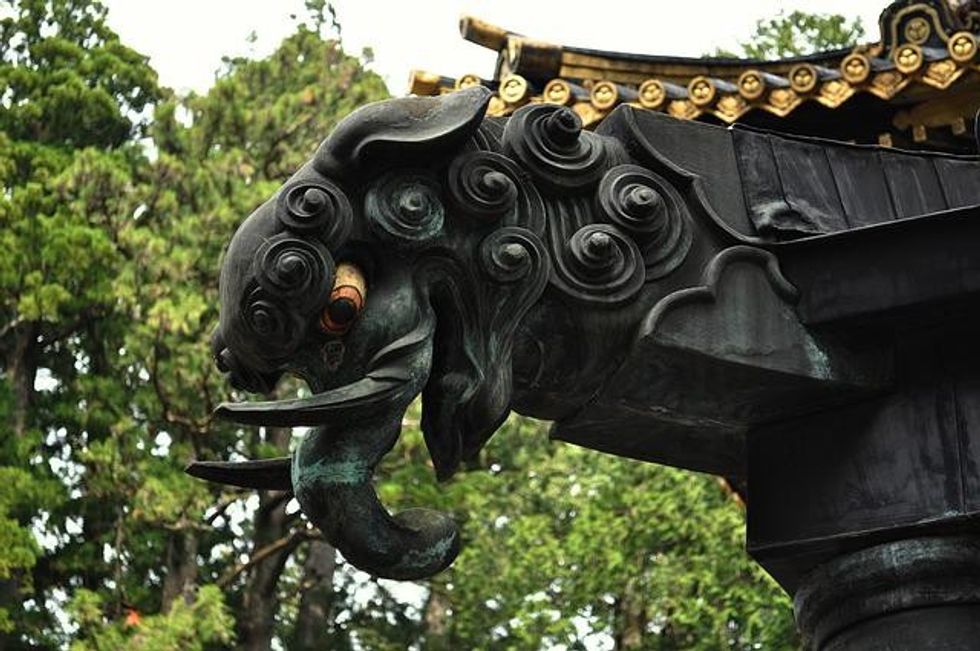Are you pulled in by the thrill and unknown of Japanese mythology? Do you fancy finding the perfect Japanese oni name that captures the spirit of Japanese folklore?
Imagine a world from Japanese culture where mysterious beings with horns and gnashing teeth lurk in the mountain's shadows and dance through ancient legends. Oni are these entities, a mix of scary and fascinating, steeped in the tales and traditions of Japanese mythology.
Whether you're a dreamer, a storyteller, or just plain curious, get ready to discover these Japanese oni names that are anything but ordinary, lighting the way into a captivating dance between humans and myth.
Ancient And Mythical Oni Names

Ready to journey into the legendary world of old Japan and discover the mighty and mysterious oni names that still echo through time? These names are not just cool to say; they're a piece of history, each one holding the secrets of powerful spirits from long, long ago. If you fancy stories of old heroes and epic adventures, these ancient Japanese oni names will take you there, adding a sprinkle of ancient magic to your day.
1. Akuma (Japanese origin): means 'demon', 'devil', or 'ogre' and is associated with evil spirits that can transform into various forms.
2. Daidarabotchi (Japanese origin): means 'giant'. It's a huge oni with outstanding and transformative power over the landscape, shaping mountains and lakes.
3. Enma (Japanese origin): means 'god of hell'. Known as the ruler of the underworld, Enma judges the souls of the deceased, deciding their fate with a balance of mercy and strictness.
4. Fujin (Japanese origin): means 'wind god'. A companion to Raijin, Fujin is the oni-like god of the wind, carrying the forces of nature in his bag.
5. Ibaraki-dōji (Japanese origin): means 'demon offspring'. It's a notorious oni associated with Shuten-dōji, symbolizing resilience and cunning. She is feared for her ability to deceive and attack unsuspecting travelers.
6. Iso onna (Japanese origin): means 'beach woman' and belongs to a coastal oni. She is often portrayed as a sea demon or mermaid who likes to lure people to watery graves.
7. Kurozuka (Japanese origin): means 'black mound'. It's the name of a witch-like oni, symbolizing the transformation of grief and rage into dark power, haunting the tales of travelers and samurai.
8. Mezu (Japanese origin): means 'horse head'. It is the counterpart to Gozu, representing the dual forces of oni that can cause calamity and chaos.
9. Onmoraki (Japanese origin): means 'shadowy unpious demon'. It is a bird-like monster that emerges from the bodies of the recently deceased and preys on the bad behavior of careless priests.
10. Otoroshi (Japanese origin): means 'scary' and is described as a hairy guardian spirit. This oni perches on shrine gates and attacks those who disrespect sacred grounds.
11. Ouni (Japanese origin): is a type of yama-uba with a slit mouth and a body covered in long black hair, representing the fearsome and unpredictable nature of oni.
12. Rashōmon no Oni (Japanese origin): is an oni associated with the famous Rashōmon gate. It symbolizes the threshold between the known and the unknown and is the guardian of forbidden realms.
Oni Names Signifying Power

Imagine names so strong they could move mountains and shake the skies! Here are oni names bursting with power, each sounding like thunder and promising adventures of legendary might. These are the names of champions and guardians from the boldest Japanese tales, ready to make any story or game epic.
13. Aka Oni (Japanese origin): means 'red demon', symbolizing the embodiment of passion and aggression, often depicted as a fierce creature with horns and a powerful presence.
14. Gaki (Japanese origin): means 'a hungry devil', representing insatiable hunger and power over famine.
15. Gozu (Japanese origin): means 'cow head' or 'ox head'. It's a pair of demon cows known for their loud, disruptive nature, symbolizing chaotic strength.
16. Ōtakemaru (Japanese origin): means 'great mountain peak'. It's a mythical oni warrior of great strength and magical prowess, symbolizing the destructive force of nature and the uncontrollable spirit of rebellion.
17. Shuten-dōji (Japanese origin): is a legendary oni known for immense strength and leading other demons. He is also known to transform into a human form.
18. Tearai Oni (Japanese origin): means 'hand washing demon'. It's a rare oni of dual genders, signifying mysterious and unpredictable power.
19. Ushi-Oni (Japanese origin): means 'demon cow'. Its terrifying presence signifies brute strength and fear.
20. Yaen (Japanese origin): means 'twin oni'. It represents masters of the ninja arts, who are known for their cunning and lethal power.
21. Zenko (Japanese origin): means 'evil field demon'. It guards graveyards and sacred places, signifying protective power.
Japanese Female Oni Names

Ever wonder about the powerful female entities from Japan's coolest tales? These female oni names pack a punch of strength and mystery. They're like the stars of amazing stories, where courage meets a dash of magic. If you're on the hunt for a name as bold and beautiful as a storybook princess but with a twist of adventure, these are the names for you.
22. Ameonna (Japanese origin): means 'rain woman'. It's an oni who controls the rain, balancing the nourishment of life with the potential for flooding and loss.
23. Hannya (Japanese origin): means 'wisdom of the Buddha'. It represents a demon engulfed in rage and jealousy, an oni that personifies how strong emotion can turn into malice.
24. Hashihime (Japanese origin): means 'the maiden of the bridge'. This is an oni born from a woman's jealousy, representing the destructive power of scorn and vengeance.
25. Kuchisake-onna (Japanese origin): means 'slit-mouthed woman'. This oni is known for her terrifying appearance and haunting urban legends.
26. Momiji (Japanese origin): means 'leaves changing color' and symbolizes a female oni whose beauty and danger are as vivid and short as autumn's colors.
27. Nure-Onna (Japanese origin): means 'wet woman'. It's a demonic sea serpent with a woman's head known for eating people it catches at sea.
28. Onibaba (Japanese origin): means 'demon hag'. It tells of a legendary cannibalistic woman who turned into an oni.
29. Osakabehime (Japanese origin): means 'princess osakabe'. It represents an oni of royal bearing and mystical power, ruling from her castle with a ghostly court.
30. Rokurokubi (Japanese origin): means 'long-necked woman'. It refers to an oni with a stretchable neck, haunting the night and displaying a rather scary appearance.
31. Yamauba (Japanese origin): is a demonic hag of Adachigahara, known for her ill will and association with mountains.
32. Yuki-Onna (Japanese origin): means 'snow woman' and represents a serene yet chilling oni who haunts snowy landscapes with her ghostly presence.
FAQs
What is the difference between a yokai and an oni?
Yokai are a big group of spirits and creatures in Japanese tales, each with its own odd and wild features. Oni are a type of yokai, but they're known for being super strong and often a tad scary, like the bosses of the spirit world.
Think of yokai as a whole fantasy team with all sorts of players, and oni as the tough ones that stand out for their power and horned heads in stories and during festivals.
What is an oni mask?
An oni mask is a colorful, fearsome mask that people wear to celebrate and imitate oni. They're decked out in bold colors with features like horns, huge eyes, and a grinning mouth with pointy teeth. During festivals, these masks are a fun way to chase away the bad stuff and spread some cheer.
Who are the kijo, and what's their story in Japanese folklore?
Kijo are female oni, or demons, in Japanese tales. They are known for their magic and unexpected turns in their stories. They often become oni because of strong feelings or tough events in their lives. Yamauba, a kindly yet spooky mountain witch who raised the hero Kintaro, is a famous kijo. Another well-known kijo is Momiji, who has powerful and captivating tales.
Who is a female oni in Japanese folklore?
A popular female oni is Yamauba, who is like a mysterious and magical witch from the mountains. Even though she might give off spooky vibes, she's also got a kind heart. For example, she took care of the brave hero Kintaro. This just shows that these special oni females, called 'kijo' in Japanese stories, can be unexpected.
Are oni female?
In Japanese folklore, oni represent a fierce type of spirit that could manifest as female, male, or any form beyond. The term 'oni' itself isn't tied to a specific gender; it encapsulates the incredible essence of the spirit behind the name.
Who is the evil female yokai?
If you're into spooky stories, meet Kuchisake-onna. She's the yokai with a chilling tale, known for her mask-covered face and eerie questions. This legend is enough to give anyone goosebumps!
What is the significance of 'oni wa soto, fuku wa uchi' in relation to oni?
This special chant comes out during Setsubun, a festival all about saying bye-bye to bad luck, which is often pictured as oni. Welcoming good fortune with these words is a big part of Japan's traditions and is super fun during the festival.
Why do some oni have blue skin?
The blue oni is often used to represent a particular kind of spirit, demon, or god in Japanese folklore. The color can symbolize a variety of traits, from coldness and ruthlessness to wisdom and nobility.
Are all oni considered evil?
Not all oni are necessarily evil. While some stories portray them as malevolent demons that eat humans, others depict them as protectors or as spirits that have been wronged, revealing a more complex moral landscape in Japanese demon lore.
Did people in ancient Japan truly believe in oni?
Back in the day, people in Japan often believed in the presence of oni and similar spirits as a normal part of life. This belief shaped how they lived, partied, and created, showing deep respect for the unseen and mysterious parts of the world.
These Japanese oni names are like secret keys to magical stories that have been told for ages. They aren't just cool-sounding; they bring the drama and mystery of old legends right to you. Each one is packed with the power to spark the imagination, filled with the spirit and wonder of Japan's deep traditions.
So, whether for naming a brave hero in a game or just getting lost in a daydream, these Japanese oni names are perfect to share and enjoy. They keep the magic of Japan's past alive, lighting up hearts with every tale they tell.
Related Articles Around the Web












